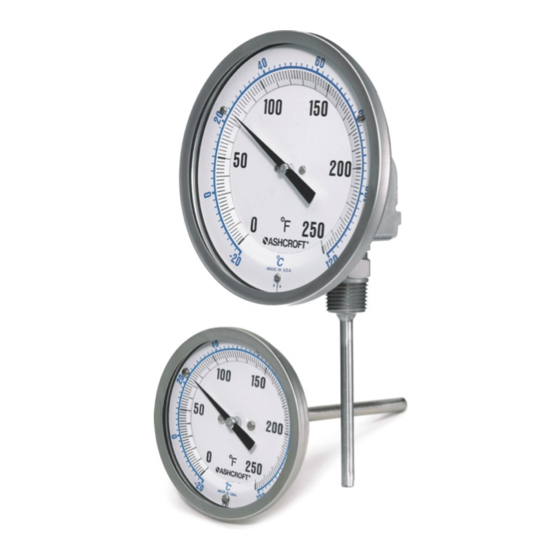Ashcroft ART Handleiding voor installatie en onderhoud - Pagina 7
Blader online of download pdf Handleiding voor installatie en onderhoud voor {categorie_naam} Ashcroft ART. Ashcroft ART 19 pagina's. Bimetal thermometer

Process media temperatures:
Dry finish
max. 500°C
F.S. = full scale value
The medium temperature depends on the ignition temperature of the surrounding gas, vapours or dust, on the design
of the device, especially the convection heat and the surface, as well as the ambient temperature and other external
heat sources. The device itself does not have its own heat source.
Temperatures in explosive atmospheres - Gases and vapours
Temperature classes
EPL
Ignition temperatures
for gases and vapours
Gb
T1 (> 450°C)
T2 (> 300°C ... ≤ 450°C)
T3 (> 200°C ... ≤ 300°C)
T4 (> 135°C ... ≤ 200°C)
T5 (> 100°C ... ≤ 135°C)
T6 (> 85°C ... ≤ 100°C)
For the device type with a compression fitting, the stem length "S" is adjustable. If a part of the
stem is not inserted in the process, the temperatures transmitted by the protruding stem must be
determined. These temperatures are to be included in the user's ignition hazard assessment.
In order to ensure proper functioning of the thermometer, a minimum immersion depth of the stem in the media of
65 mm to 100 mm, depending on the instrument type, must be observed.
Temperatures in explosive atmospheres - Dusts
For the determination of the ignition temperature, the method according to ISO/IEC 80079-20-2 is to be used. This can
only be carried out by the user on site for the individual case. The device-specific properties as well as the limit
temperatures of the dusts and their form as a deposited layer or in the form of a surrounding dust cloud must be taken
into account here. For this reason, the ignition temperatures must be determined separately. In the case of dust layers,
the thickness of the dust layer must be taken into account as a further criterion.
Permissible max. media temperature
Overload temperature
short term
<120°C
= 100 % F.S.
>120°C up to 289°C
= 50% F.S.
≥290°C up to 500°C
no overload
Permissible, max. surfaces
incl. ambient temperature
Dry finish
425°C
290°C
195°C
130°C
95°C
80°C
Silicone filled devices
max. 300°C
Liquid filled
devices
250°C
250°C
The maximum surface temperature including
the ambient temperature, for the application
195°C
on site, depends on the device type with its
technical specifications. The lowest
130°C
temperature limits apply in each case.
95°C
80°C
page 7 of 19
Overload temperature
short term
<120°C
= 100 % F.S.
>120°C up to 200°C
= 50% F.S.
>200°C up to 300°C
no overload
